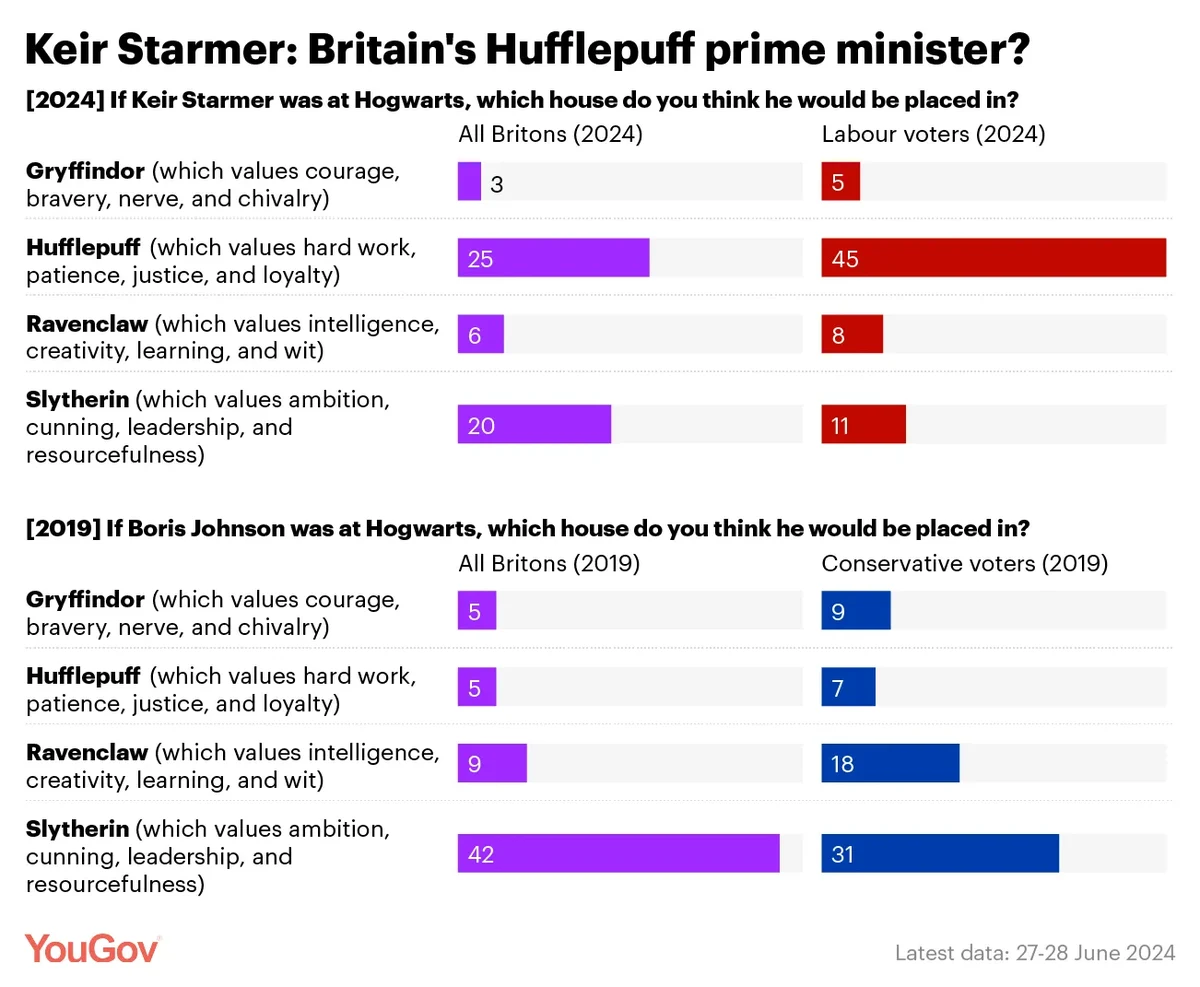Views of Starmer tend to be more negative than positive
Labour have won the 2024 general election, and Keir Starmer will head to Buckingham Palace later today to be invited by King Charles to form a government. But what do the public make of the man who will be our new prime minister?
On the cusp of his ascension to Number 10, half of Britons (49%) say they don’t know what Keir Starmer stands for, including one in five (21%) who were intending to back his party just days away from the election.
One in three Britons (33%) say they have a broad idea of what Keir Starmer stands for, but only 9% feel like they are very clear on what he stands for. Most Labour voters feel they broadly know where Starmer stands (57%) and a further one in five (18%) feel like they have a very clear picture.
When it comes to the kind of prime minister Keir Starmer is going to be, the public see him as a more conventional kind of politician – 57% say he will be “much like previous prime ministers”. This stands in contrast to Boris Johnson, of whom 52% of Britons said in 2019 “will be a completely new type of prime minister”.
When asked specifically which prime ministers Starmer is similar to, the most common answers are Tony Blair (39%) and Gordon Brown (37%). Labour voters in particular are likely to see him as similar to the two most recent Labour prime ministers (44-45%).
Starmer may be unpopular, but he’s also seen as the best man for the job
Our most recent favourability survey finds that while Keir Starmer is the most popular politician in the country, he is still unpopular overall. One in three (36%) have a favourable view of the Labour leader, compared to 54% who have an unfavourable opinion, giving a net favourability score of -18.
This is, however, streets ahead of his Conservative opponent, with Rishi Sunak languishing on near record unpopularity levels of -53.
Likewise, the public explicitly tend to pick Starmer over Sunak for the role of prime minister when asked to choose between the two. Our poll last week found 38% saying Starmer would do a better job, compared to only 17% for Sunak. A separate poll two weeks ago found Starmer also handsomely beating Lib Dem leader Ed Davey and Reform UK leader Nigel Farage on the best prime minister question.
Do people think Keir Starmer will be a good prime minister?
Better though he might be seen as being than Rishi Sunak, there is a lack of confidence in how good a prime minister Keir Starmer will be in his own right. Asked in early June, only 23% of Britons said they thought he would be “good” or “great”. A further 30% expected that he would be “average”, while one in three (33%) expected him to be “poor” or “terrible”.
These are at least much better expectations than Rishi Sunak’s current reviews – 54% said he has been poor or terrible as prime minister – and in any case most of Starmer’s own voters have positive expectations of the Labour leader (54% thought he would be good or great).
Personal characteristics
One of Starmer’s core pitches has been his competence, and this is the characteristic on which he performs most favourably with the public. That said, the public are divided on this point – while 40% feel Starmer is a competent character, an equal 40% disagree.
On other attributes, Starmer performs significantly worse. The public see him as weak by 46% to 28%; as dislikeable by 47% to 32%; as untrustworthy by 49% to 29%; and as indecisive by 52% to 28%.
As ever, Starmer can at least rely on being seen less unfavourably than Rishi Sunak, against whom he scores more highly across all five measures.
Keir Starmer: Britain’s Hufflepuff prime minister?
Perhaps a more instructive measure would be the Harry Potter sorting hat test. Asked which set of Hogwarts house values that Keir Starmer most embodies, the British public would be most likely to sort the Labour leader into Hufflepuff: a quarter (25%) think he belongs most in the house which values hard work, patience, justice, and loyalty. In second place are the 20% who would put him in Slytherin, which values ambition, cunning, leadership, and resourcefulness. Few place him in Ravenclaw (6%) or Gryffindor (3%), with the rest unsure.
J.K. Rowling’s description of each house’s values tends to mark Slytherin out as the ‘bad guy’ house, and the responses are predictably partisan, with those who had been planning to vote for parties more at odds with Labour (like the Tories, Reform UK and Greens) tending to put Starmer alongside Lord Voldemort and Draco Malfoy. By contrast, Labour voters themselves are far more likely to feel that Starmer is a Hufflepuff, at 45%.

Boris Johnson was, incidentally, overwhelmingly placed in Slytherin in 2019, at 42% versus 5-9% placing him in another house (even Conservative voters tended to put him in the green house).
What do you think about Keir Starmer, the Labour landslide victory, and everything else? Have your say, join the YouGov panel, and get paid to share your thoughts. Sign up here.
Photo: Getty








